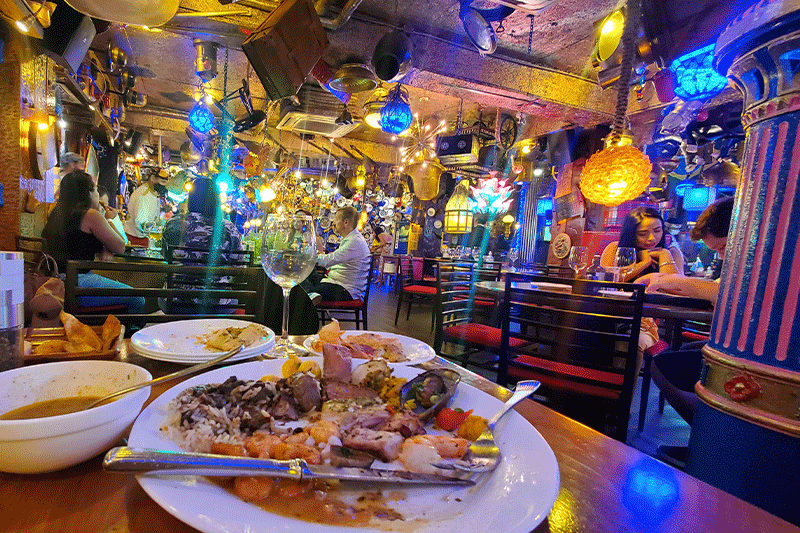The Cost of Visiting Rio de Janeiro, Brazil: A Budget Breakdown
Rio de Janeiro, the vibrant and iconic Brazilian city, is famous for its stunning beaches, lush mountains, and lively atmosphere. The cost to visit Rio De Janeiro can vary greatly depending on factors like your travel style, accommodation preferences, and the activities you plan to do. In this guide, we’ll provide a general overview of the expenses you can expect when visiting Rio de Janeiro. Check out what to bring to rio de janeiro.
1. Flight Cost To Rio De Janeiro
The cost of flights to Rio de Janeiro depends on your departure location, the time of year, and how far in advance you book your tickets. Generally, flights from the United States to Rio can range from $500 to $2,400 round trip. To get the best deals on flights, consider booking during the low season (April to June and September to November) and monitoring fare prices with tools like Google Flights or Skyscanner. You can book through Expedia to save more.
Before You Can Board Your Flight You Need An e-Visa
The introduction of a new e-visa fee for American travelers has added an extra cost to their international journeys. This new fee, which amounts to $80.90 USD, is now obligatory during the e-visa application process. This additional expense represents a significant change in the visa application protocol and could potentially influence the budgeting decisions of travelers. It’s a crucial factor to consider while planning any overseas trip, as it adds to the overall cost of international travel.
2. Accommodation Prices In Rio De Janeiro

Rio de Janeiro offers a wide range of accommodation options to suit various budgets and preferences. Here’s a rough estimate of nightly prices for different types of accommodations:
- Budget (hostels, guesthouses): $10 – $30 per night
- Mid-range (standard hotels, boutique hotels): $50 – $150 per night
- Luxury (high-end hotels, resorts): $160 and up per night
Accommodations in Rio de Janeiro offer a variety of options to fit different budgets and preferences. From budget-friendly hostels to luxurious five-star hotels, the city has something for everyone.
To save money on accommodations, consider booking in advance, traveling during the low season, or staying in less touristy neighborhoods. Make sure you are using Expedia for booking your accommodations because the points add up for free stays. You can also find some nice places to stay on AirBnB in Rio De Janeiro.
For those traveling on a budget, hostels are a popular choice. These accommodations typically offer shared dormitory-style rooms, promoting a social atmosphere that is often favored by solo or young travelers. Prices for a bed in a shared room can start as low as $10 USD per night. These hostels often come with shared amenities like kitchens, lounges, and sometimes even pools.
Mid-range hotels offer another option, providing more privacy and amenities than hostels. These establishments typically feature private rooms, many with in-suite bathrooms, and often include breakfast in their rates. Prices for mid-range hotels in Rio can range from $50 to $150 USD per night. These hotels are frequently found in convenient locations, close to major attractions or transportation hubs.
For a more luxurious experience, Rio de Janeiro has an array of high-end hotels and resorts. These luxury accommodations offer top-tier amenities such as gourmet dining, spa services, and often boast stunning views of the city’s iconic landscapes like Sugarloaf Mountain or Copacabana Beach. Prices for these upscale establishments can start around $160 USD per night and can go into the several hundreds for the most premium options.
In addition to traditional hotels, Airbnb are also a popular choice in Rio. These range from smaller apartments to spacious beachfront villas and can provide a homelike feel during your stay. Prices can vary greatly depending on size, location, and amenities, but a typical vacation rental in the city might range from $50 to over $2500 USD per night. This type of accommodation can be particularly cost-effective for longer stays or larger groups.
3. Food and Drink Prices In Rio De Janeiro

Rio boasts a diverse culinary scene, offering both traditional Brazilian cuisine and international dishes. Dining costs can vary based on the type of restaurant and your personal preferences. Here’s a rough estimate of food and drink expenses:
- Budget (street food, local markets): $3 – $8 per meal
- Mid-range (casual restaurants, cafes): $10 – $25 per meal
- High-end (fine dining, upscale restaurants): $30 and up per meal
To cut down on food expenses, consider eating at local markets or street food stalls, where you can find delicious and affordable meals. I personally enjoy eating at Brazilian Steak houses in Rio de Janeiro. A few of them consist of Fogo de Chao, and Marius Degustare.
The cost of dining in Rio de Janeiro can vary greatly, depending on the type of establishment and the cuisine. For dinner, a good estimate for most mid-priced restaurants would be around 50-80 Brazilian reais, which offers a range of options from local Brazilian dishes to international cuisines. Some of these restaurants are even located in prime locations, offering not just good food but also stunning views of the city.
Street food is a popular and budget-friendly option in Rio. A typical meal of rice, beans, and meat, staples in Brazilian cuisine, can be found for as little as $5 USD. These meals are not just affordable but are also flavorful and filling, providing a taste of the local culture.
For those who prefer a more upscale dining experience, expect to pay around $30 USD. These high-end restaurants often feature gourmet dishes and exceptional service, providing a more luxurious dining experience. Some of these restaurants are located in Rio’s top hotels and resorts, offering breathtaking views and exquisite culinary creations.
Fast food is also readily available in Rio de Janeiro. A typical fast food meal, such as a McMeal at McDonald’s or a similar combo meal at Burger King, costs around 7.10 USD. This provides a quick and convenient dining option, especially for those on the go.
Grocery shopping is another option for those looking to save on food expenses. The cost of groceries can vary, but generally, prices are reasonable. Fresh fruits, vegetables, meat, and other basics are widely available, allowing visitors to prepare their own meals if they have access to a kitchen. This can be a cost-effective alternative to eating out, especially for longer stays.
4. Transportation Cost In Rio De Janeiro
Transportation costs in Rio de Janeiro are generally quite affordable. Here’s an overview of the approximate costs for various modes of transportation:
- Bus: $1 – $2 per ride
- Metro: $1 – $2 per ride
- Taxi/Uber: $2 – $20 per ride, depending on the distance
Transportation in Rio de Janeiro, Brazil’s vibrant and bustling city, is varied and caters to different preferences and budgets. The cost varies depending on the mode of transportation.
The subway system, known as the Metro Rio, is a popular choice for both locals and tourists due to its efficiency and extensive coverage of the city. Single subway tickets are relatively affordable, costing approximately 7 reais (around $1.50 USD). For regular commuters or those planning to use the metro extensively during their stay, there are also multi-ride cards available which offer slightly better value.
Buses are another common form of public transportation in Rio. They cover nearly all areas of the city and are quite frequent. Bus fares are typically around 5 reais (approximately $1 USD). While buses can be crowded during peak hours, they are an economical way to navigate the city.
For those preferring private transportation, Uber operates extensively in Rio de Janeiro. The cost of an Uber ride varies depending on the distance and time of travel, but generally, it is considered a more affordable option compared to traditional taxis. An average Uber trip within the city can range from 10 to 30 reais (roughly $2 to $6 USD).
Taxis, while being a bit more expensive than Uber, are widely available throughout the city. They offer convenience and comfort, especially for those unfamiliar with the city’s public transportation system. A taxi ride within the city center can cost anywhere between 20 to 50 reais (about $4 to $10 USD).
The cost of transportation in Rio de Janeiro is quite varied, catering to different budgets and preferences. Whether you choose to navigate the city by subway, bus, Uber, or taxi, each mode of transportation offers its own unique way to experience the city.
Keep in mind that some attractions in Rio, such as the famous beaches, can be easily reached using public transportation or by walking. I was a big fan of the Lime Scooters in Copacabana when I wanted to get around the beach area quickly but it seems that they have now removed them. They have electric bikes you can rent but I personally stick to using Uber. The uber prices around Copacabana is usually about $2-3 dollars depending on the time of day.
5. Activities and Sightseeing Prices In Rio

The cost of activities and sightseeing in Rio de Janeiro can vary widely based on your interests. Some popular attractions and their approximate entrance fees include:
- Christ the Redeemer (Corcovado): $15 – $20
- Sugarloaf Mountain: $20 – $25
- Jardim Botânico: $5 – $10
Many of Rio’s attractions, such as the Copacabana and Ipanema beaches, can be enjoyed for free. However, if you plan to take guided tours, participate in water sports, or visit cultural sites, expect to pay additional fees ranging from $10 to $100 or more, depending on the activity. The most popular attraction is going to be the Christ the Redeemer Statue.
Sightseeing and activities in Rio de Janeiro offer a wide range of prices, accommodating travelers with various budgets. The city’s top attractions, such as Christ the Redeemer and Sugar Loaf Mountain, are among the must-visit spots. A private tour covering these essentials can cost around $100+. These tours often last about 4 to 5 hours and usually include transportation, a guide, and sometimes even meals.
For those who prefer to explore at their own pace, skip-the-line tickets are available for various attractions. For example, a skip-the-line ticket to Christ the Redeemer costs around $39.00. This option allows travelers to bypass the long queues and have more time to enjoy their visit to this iconic landmark. Similarly, fast pass tickets for Bondinho Pão de Açúcar, another famous attraction, are also available.
Adventurous tours are also popular in Rio, offering a different perspective on the city. These tours often involve activities such as hiking, biking, or even hang gliding, providing an exciting way to see the sights. The prices for these tours vary greatly depending on the activity and duration, but they offer a unique way to experience the city.
A week-long trip to Rio, including accommodation, food, and activities, typically costs around $1000 per person or $1,400 for two people. This estimate gives a good idea of the overall cost of a vacation in Rio, allowing travelers to budget accordingly.
There are also many budget-friendly things to do in Rio. Visiting the beaches, such as Ipanema Beach, is free, and exploring the Botanical Gardens only costs a small entrance fee. Using public transportation like the Rio Metro, which costs less than $1 per ride, is another cost-effective way to get around and see the sights.
The Cost to Visit Rio De Janeiro During New Year’s Eve
Visiting Rio de Janeiro during New Year’s Eve can be an exhilarating experience, but it’s important to note that this is a peak tourist time and costs can be higher than other times of the year. Accommodation prices, especially in popular areas like Copacabana and Ipanema, can significantly increase due to high demand. A decent hotel room could cost anywhere from $200 to $500 per night, depending on the location and amenities.
Dining out and partying also add to the expenses, with meals at upscale restaurants and entry fees to exclusive clubs costing more. Additionally, transportation costs may rise due to increased demand. So, while the exact amount can vary based on personal preferences and lifestyle, one should expect to spend considerably more when visiting Rio during New Year’s Eve compared to off-peak times. Learn more about visiting Rio De Janeiro for New Years Eve.
The Cost To Visit Rio De Janeiro During Carnaval
During Carnaval, You Can expect the Prices to go up to 3x the normal cost. Especially when considering Accommodations. You can attend Blocos around the city for free but if you want to go to the Samba Parades then the prices can start at $30 and go up to $1500 depending on your seats and how soon you book your tickets. You may also want to consider the day of the parade. Some days are more popular than others bringing out different bands. Find out More About Carnaval In Rio De Janeiro.
Cash Limitations When Traveling to Brazil
Some of you are wondering how much cash can you bring to Brazil. Some of you didn’t know that you are required to declare any amount close to and/or over $2000 USD, depending on the conversion rate. Traveling with cash can be a necessity, especially when visiting a foreign country like Brazil. However, it’s important to understand the limitations and rules set by the country regarding how much cash a traveler can bring in to avoid any potential legal issues.
Declaration Requirement for Large Amounts
In Brazil, travelers are allowed to enter or leave the country with any amount of national or foreign currency. However, if you are carrying an amount equivalent to or greater than R$10,000 (Brazilian Reais), or its equivalent in another currency, it must be declared to the Brazilian Customs. Failure to properly declare the amounts can result in penalties or confiscation of the money.
Penalties for Non-Declaration
If a traveler fails to declare their money or provides inaccurate information, they may face fines and other legal consequences. The undeclared money could be seized by customs officials. In some cases, legal proceedings could be initiated, which could lead to further complications and delays in travel plans.
Safety Considerations
While it’s legally permissible to carry large amounts of cash, it’s also important to consider safety. Carrying large sums of money can make travelers a target for theft or robbery. Therefore, it’s often recommended to use other forms of payment, such as credit cards or traveler’s checks, whenever possible to minimize risk.
Alternative Payment Methods
In addition to safety concerns, carrying large amounts of cash can be inconvenient. Many places in Brazil accept credit and debit cards, and ATMs are widely available for cash withdrawals. Using electronic forms of payment can provide security, convenience, and often a more favorable exchange rate.
Moving Foward
While there is no limit on the amount of cash you can bring into Brazil, amounts exceeding R$10,000 or its equivalent in other currencies must be declared to customs. However, for safety and convenience, travelers are often advised to rely more on credit cards and other electronic forms of payment. As of today R$10,000 is equal to around $2000 USD. I recommend using a credit card for your payments at grocery stores and finer restaurant establishments and pulling cash out of the atm when you need it. USD is not an accepted form of payment in Brazil anyway. It will be good to have some cash just in case of an emergency in your safe but besides that it’s worthless.
In Conclusion: The Cost To Visit Rio De Janeiro
The cost of visiting Rio de Janeiro, Brazil, depends on factors like your travel style, accommodation choices, and planned activities. I can easily spend $300 USD a day without trying and that’s not including accommodations. I can also spend a day at the beach and get by on a tight budget of $50 USD A Day. By carefully planning your trip, setting a budget, and prioritizing your expenses, you can enjoy a memorable visit to this vibrant and beautiful city without breaking the bank. If you want more information about Rio de Janeiro make sure to look at my blog post about where to stay in Rio De Janeiro for everything you will need to know.

